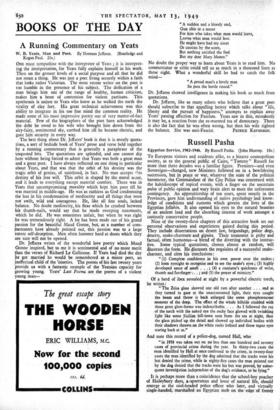BOOKS OF THE DAY
A Running Commentary on Yeats
ONE must sympathise with the interpreter of Yeats ; it is interpret- ing the interpretation, for Yeats fully explains himself in his work. Then on the grosser levels of a social purpose and all that he did not mean a thing. He was just a poet living securely within a faith that looks rather Victorian. The most recent writer on the poet is too humble in the presence of his subject. The deification of a man brings him out of the range of healthy, human criticism, makes him a bone of contention for violent partisans. This apotheosis is unjust to Yeats who knew as he walked the earth the vitality of clay feet. His great technical achievement was this ability to integrate in his too fine mind the common reality. He made some of his most impressive poetry out of very matter-of-fact material. Few of the biographers of the poet have acknowledged the debt he owed to his wife who brought him down from the airy-fairy, sentimental sky, earthed him till he became electric, and gave him security in every way.
The best thing about Dr. Jeffares' book is that it is mostly quota- tions, a sort of bedside book of Yeats' prose and verse held together by a running commentary that is generally a paraphrase of the Unquoted bits. The quotations are splendid, and one cannot dip here without being forced to admit that Yeats was both a great man and a great poet. I have always reflected on one thing in particular about Yeats, and that was that the orbit of his destiny was the tragic orbit of genius, of sainthood, in fact. No man accepts this destiny of his free will. This orbit is shaped by the moral sease, and it leads to everything except material comfort. There was in Yeats that uncompromising morality which kept him poor till he was married in middle-age. He was as ruthless as God condemning the lost in his condemnation of mediocrity and all things that were not swift, wild and courageous. He, like all fine souls, lacked balance. No doubt mediocrity, his fleas which he crushed between his thumb-nails, would say that he made sweeping statements, which he did. He was sometimes unfair, but when he was right he was tremendously right. A lot has been made out of his grand passion for the beautiful Maud Gonne, but, as a number of corn- tnentators have already pointed out, this passion was to a large extent self-deception. Men often hammer hard at doors which they are sure will not be opened.
Dr. Jeffares writes of the wonderful love poetry which Maud Gonne inspired, but to me it is sentimental and of no more merit than the verses of Richard Le Gallienne. If Yeats had died the day he got married he would be remembered as a minor poet, an ineffectual child of the 'nineties. The poems of his last twenty years provide us with a fantastic example of the Yeatsian capacity for growing young. Yeats' Last Poems are the poems of a violent young man— "A sudden and a bloody end,
Gun shot or a noose For him who takes what man would leave, Leaves what man would lose.
He might have had my sister Or cousins by the score, But nothing satisfied the fool But my dear Mary Moore."
No doubt the proper way to learn about Yeats is to read him. No commentator or critic could tell us as much in a thousand lines as those eight. What a wonderful skill he had to catch the folk mind- " A proud man's a lovely man
So pass the bottle round."
Dr. Jeffares showed intelligence in making his book so much from quotations.
Dr. Jeffares, like so many others who believe that a great poet should subscribe to that appalling heresy which talks about "life, liberty and the pursuit of happiness," attempts to explain away Yeats' passing affection for Fascism. Yeats saw in this, mistakenly it may be, a reaction from the re-warmed tea of democracy. There is also the fact that he was often wrong, but then his wife righted the balance. She was anti-Fascist. PATRICK KAVANAGH.






































 Previous page
Previous page